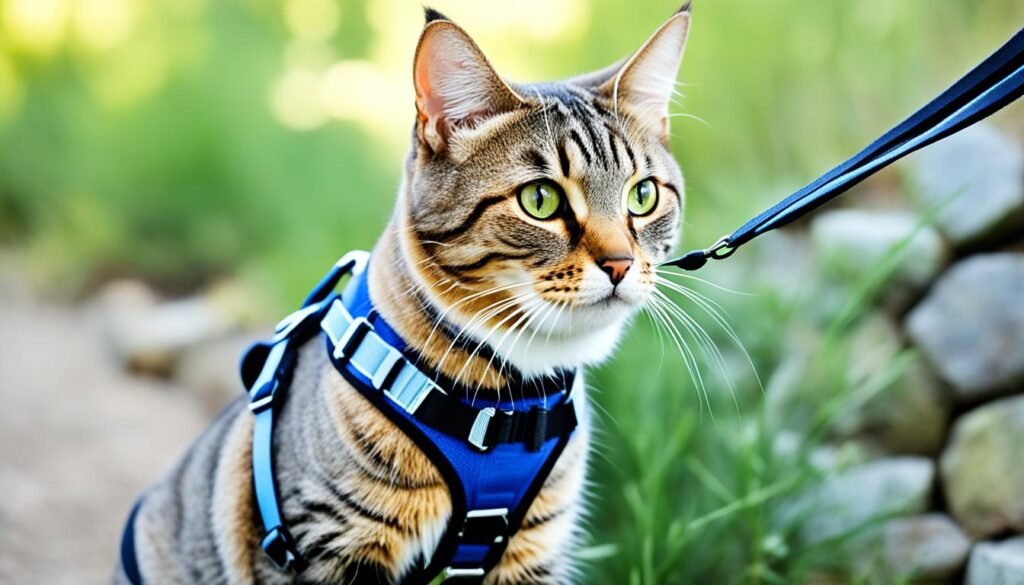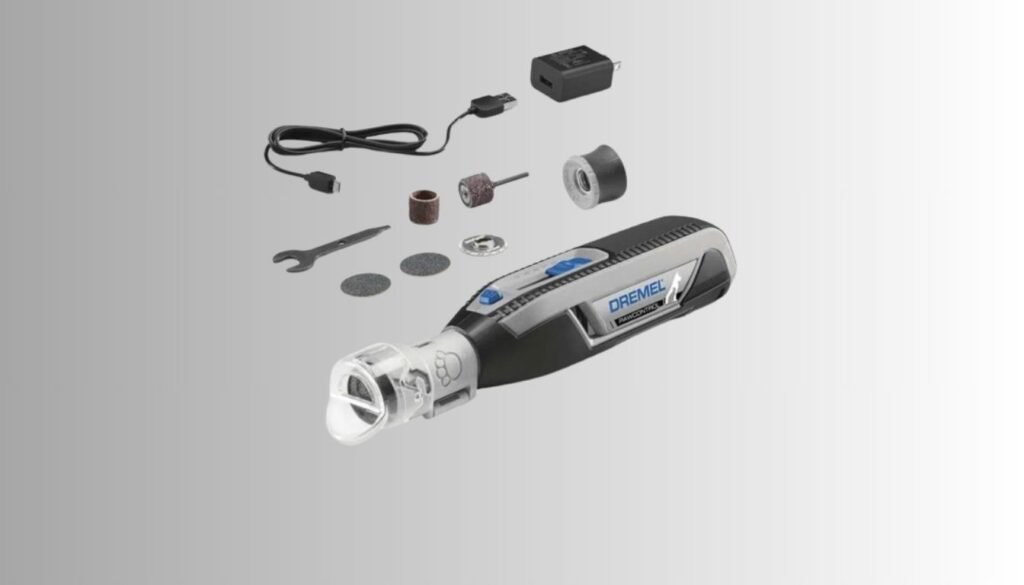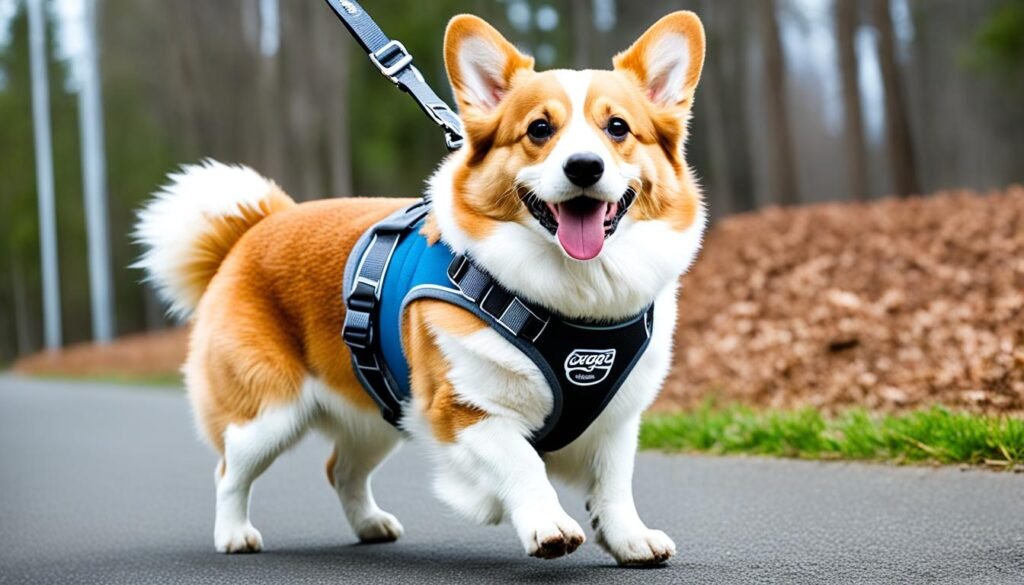As a diligent pet owner, you want to ensure your dog gets the best diet. This means including grains packed with important nutrients. In this guide, you’ll learn about the best grains for dogs. We will cover why grains matter, which whole and ancient grains are great, and which ones to steer clear of. We also look at the debate between grain-free and grain-inclusive meals.
We’ll explain the benefits of grain-inclusive diets and share advice on selecting top-quality food for your four-legged friend.
So, what are the top grains for your pet? Brown rice, oats, barley, and quinoa are some popular choices. It can be hard to know which ones are best. By the time you finish reading, you’ll be well-versed on the ideal grains for dogs.
The Importance of Grains in a Dog’s Diet
Grains are an important part of what dogs eat. They give your pet lots of carbohydrates for energy. This energy is used for running, playing, and overall daily life. Grains like barley, oats, and brown rice also bring key nutrients for a dog’s health. They are packed with fibre, vitamins, minerals, and omega fatty acids.
Barley, oats, brown rice, and rye have the whole grain inside them. This means they keep all the good parts – endosperm, bran, and germ. Such grains offer many health benefits to your dog. Adding these grains to meals helps give your pet the nutrition they need.
| Grain | Nutritional Benefits for Dogs |
|---|---|
| Barley | Rich in soluble fibre, beta-glucans, and minerals like iron and zinc, which promote overall well-being. |
| Oats | Provides a source of protein, fibre, and essential nutrients like magnesium and potassium. |
| Brown Rice | An easily digestible source of complex carbohydrates and B vitamins. |
| Rye | Provides a source of protein, fiber, and essential nutrients like magnesium and potassium. |
Types of Whole Grains for Dogs
Many top-notch dog foods have whole grains in them. They offer carbs and key nutrients dogs need. Some top whole grains for dogs are:
Barley
Barley is very nutritious and good for dogs. Its fibre content boosts digestion. Plus, it contains vitamins like manganese, copper, and selenium. Barley is a solid complex carbohydrate source that gives dogs steady energy.
Oats
Oats are great for dogs, too. They’re rich in fibre, which keeps blood sugar steady and digestion healthy. Oats also have beta-glucans, which help fight inflammation and boost the immune system. They’re a perfect choice for dogs with digestion or skin issues.
Brown Rice
Brown rice is common in premium dog foods. It’s a complex carbohydrate that offers lasting energy. It has fiber, vitamins, and minerals. Since it keeps its bran and germ, it’s more nutritious than white rice. For dogs, it’s a good source of reliable carbohydrates.
Ancient Grains for Dogs
Ancient grains add extra nutrition to your dog’s meals. Grains like amaranth and quinoa have been around for thousands of years. They’re full of good stuff for your dog and work well in a balanced, grain-friendly diet.
Amaranth
Amaranth is packed with protein, fibre, and minerals. It’s good for your dog’s immune system and can make their skin and coat shiny. This grain gives your dog lasting energy and is a smart choice for their meals.
Quinoa
Another valuable ancient grain is quinoa. It’s a complete protein, has fiber, and contains many vitamins and minerals. Quinoa supports stable blood sugar and heart health and keeps your dog’s coat looking its best. It’s perfect for dogs that have to avoid gluten.
Grains to Avoid in Dog Food
Not all grains are good for dogs. Some grains shouldn’t be part of their diet. Avoid giving dogs these:
Whole Wheat
Whole wheat may be in low-quality dog foods. Dogs find it hard to digest, and eating it can cause stomach problems like bloating and gas. Some dogs are also allergic to it.
Corn
Corn is often used in commercial dog foods, but it’s not the best for dogs. Dogs get little nutrition from corn, and some may also be allergic to it. It’s mostly a filler in low-quality brands.
Instead of whole wheat and corn, choose better grains. Choose barley, oats, and brown rice. These grains are healthier and easier for dogs to eat and offer more nutrients.
Best grains for dogs
Many whole and ancient grains are great for dogs. Barley, oats, brown rice, amaranth, and quinoa are top choices. These grains are packed with carbs, fibre, vitamins, minerals, and nutrients. They help keep your dog healthy and happy.
Adding these grains to your dog’s meals offers complete nutrition. Your furry friend will get the right balance to thrive.
| Grain | Nutritional Benefits for Dogs |
|---|---|
| Barley | Rich in fibre, selenium, and vitamin B6, which support digestive and cardiovascular health. |
| Oats | High in soluble fibre, beta-glucans, and antioxidants, which can help regulate blood sugar and reduce inflammation. |
| Brown Rice | Provides complex carbohydrates, manganese, and B vitamins to promote energy and overall wellness. |
| Amaranth | An ancient grain packed with protein, fibre, and essential minerals like iron, magnesium, and calcium. |
| Quinoa | A complete protein source that also contains fibre, vitamins, and beneficial plant compounds. |
Grain-Free vs. Grain-Inclusive Diets
Dog owners often debate grain-free versus grain-inclusive dog foods. Grain-free diets exclude wheat, corn, barley, and rice and are meant for dogs with allergies or food intolerances.
Benefits of Grain-Free Diets
Grain-free dog foods work well for dogs who are sensitive to grains. They can ease issues such as skin problems, tummy upsets, and frequent ear infections.
These diets turn to sources like potatoes, sweet potatoes, and legumes for their carbs. These can be friendlier on the stomach for some dogs.
Advantages of Grain-Inclusive Diets
Yet, grain-inclusive diets also have a lot to offer. They include whole grains such as brown rice, oats, and barley. These grains add fibre, vitamins, and minerals to your dog’s diet.
Grains in these diets also provide a good energy boost for your pet. And importantly, grain-inclusive foods tend to be more budget-friendly than grain-free options. This makes them a better choice for some pet owners.
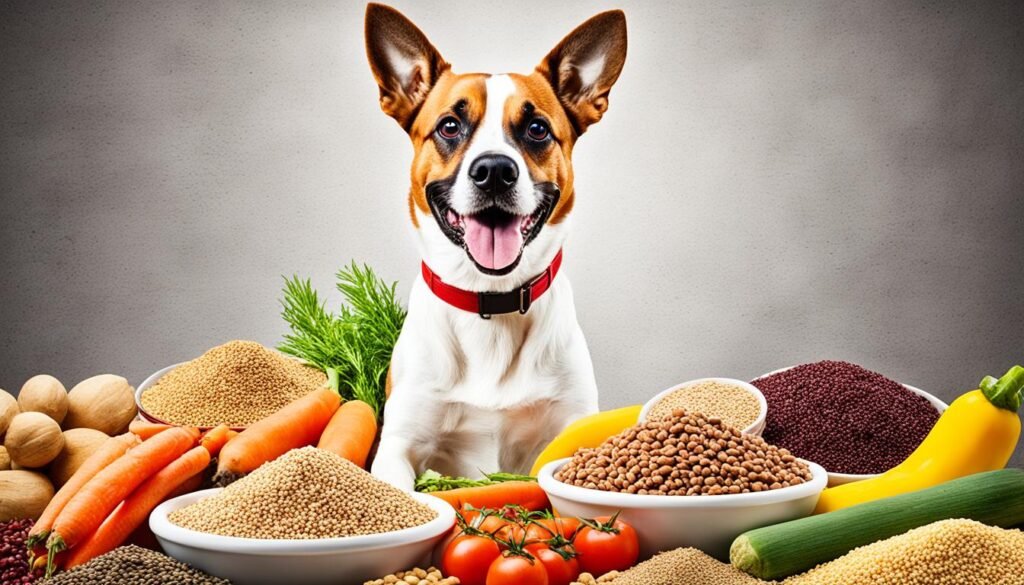
Deciding between grain-free and grain-inclusive foods? Think about your dog’s needs and any food sensitivities. Talking to your vet is key to finding the right food for your four-legged friend.
Choosing a Healthy Grain-Inclusive Diet
It’s crucial to pick a top-notch grain-inclusive dog food. Choose one made with the best, whole ingredients. Look for a formula highlighting a single, top-level animal protein source, like meat or fish. Avoid diets full of fillers, additives, or low-quality stuff.
Quality Ingredients
A healthy grain-inclusive dog food relies on top-notch ingredients. Go for foods with real, unprocessed grains, such as brown rice. These healthy grain-inclusive dog food products are rich in complex carbs, fibre, and key nutrients. Stay away from foods with cheap fillers and unhealthy additions. They could harm your dog’s health.
Balanced Nutrition
Quality isn’t the only important thing. A good grain-inclusive dog food needs to be balanced. It must provide all the essential nutrients your dog needs, like proteins, fats, and vitamins. Make sure the food you pick meets the standards of the Association of American Feed Control Officials (AAFCO). This way, your dog will get a complete and balanced dog food nutrition.
Common Misconceptions About Grains in Dog Food
Grains are often misunderstood in dog food discussions. Some believe grains can cause allergies, while others argue that dogs should eat like wild wolves do, with little grain.
Many think grains are a top allergy culprit in dog food. However, studies show that proteins like beef and chicken are the main causes. Only a few dogs are sensitive to certain grains, and for most, grains are safe.
Does your dog have to eat like a wild wolf? Not really. Even though wolves are strict carnivores, dogs have changed. Over time, they’ve become good at eating and using carbs from grains. Studies back this up, showing dogs can handle starchy foods much better now than their ancestors could.
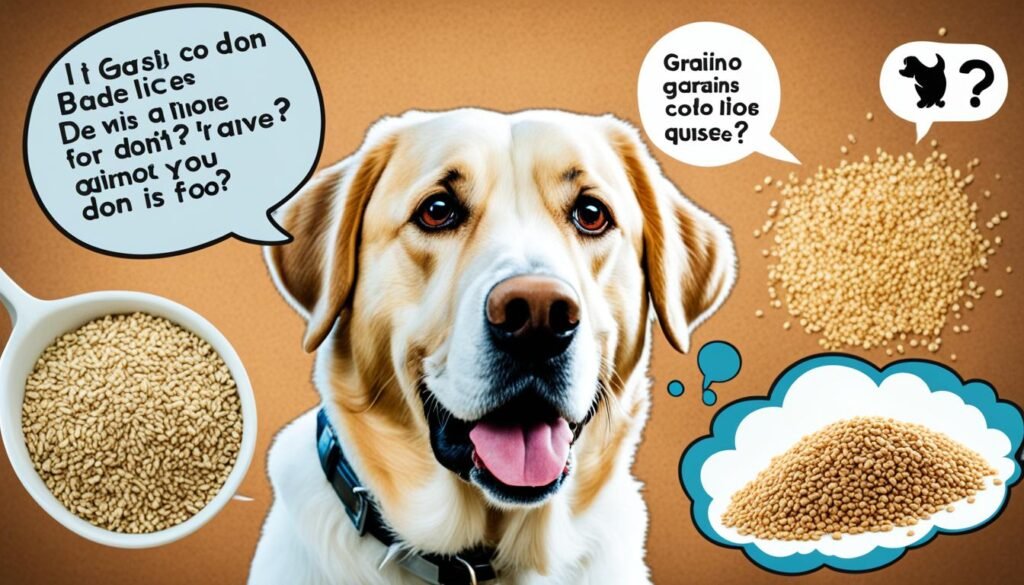
Debunking these myths lets pet owners choose better for their dogs. They can offer a diet with grains that boosts health and happiness. It’s all about helping our pets thrive.
Grains and Allergies in Dogs
Grains usually don’t cause food allergies in dogs. Yet, some dogs might be sensitive to certain grain ingredients. Common allergens for dogs are beef, dairy, wheat, chicken, and eggs. Knowing about these allergies helps owners feed their dogs a healthy, balanced diet.
Top Allergens for Dogs
| Allergen | Prevalence in Dogs | Potential Symptoms |
|---|---|---|
| Beef | 15-30% | Itching, skin irritation, digestive issues |
| Dairy | 10-15% | Vomiting, diarrhoea, skin inflammation |
| Wheat | 5-10% | Gastrointestinal problems, skin rashes |
| Chicken | 5-10% | Itching, hot spots, ear infections |
| Eggs | 5-10% | Digestive issues, skin irritation |
Knowing the main allergens is key for pet owners. It helps them choose the right dog food. They can pick grain-inclusive foods that avoid these triggers. This way, they provide good nutrition to their pets.
The Role of Grains in a Dog’s Ancestral Diet
Many think dogs should eat like wild wolves, mostly meat. But, research suggests dogs can use grains better than wolves. Over time, the dog’s ancestral diet has become more varied, including grains in the dog’s diet.
Dogs come from wolves. Yet, they’ve changed a lot, especially in how they handle grains. This change likely happened when dogs and people first started living together. Then, dogs found new kinds of food, like grains, around human homes.
When it comes to eating, dogs do better with grains than wolves do. This skill means dogs can live well with a diet that has both grains and meat. It’s an important change that lets dogs get what they need from grains alongside meat.
Transitioning Your Dog to a Grain-Inclusive Diet
If you’re thinking of moving your dog from grain-free to grain-inclusive, do it slowly. Start mixing a little grain-inclusive food with the current one. Slowly increase the new food amount over a week or two.
This method avoids upsetting your dog’s stomach with a sudden food change. It also gives your pet time to get used to new nutrients and fibre, such as barley, oats, and brown rice.
Watch your dog closely as you change them to grain-based food. Look for changes in appetite, energy, and digestion. Any discomfort or stool changes could mean you need to slow the switch or see a vet. Being patient and careful helps your dog get the full benefits of a grain-inclusive diet.
FAQ
What are the best grains for dogs?
Barley, oats, and brown rice are the top grains for dogs. They provide carbohydrates, fibre, and many nutrients, which help keep dogs healthy and happy.
Why are grains important in a dog’s diet?
Grains are crucial for a dog’s balanced diet. They offer long-lasting energy and essential nutrients, including fibre and omega-3 fatty acids.
What types of whole grains are good for dogs?
Dogs benefit from whole grains like barley, oats, and brown rice. These grains are packed with nutrients. They’re great for a dog’s health.
What ancient grains can be included in a dog’s diet?
Amaranth and quinoa are ancient grains perfect for dogs. They’ve been around for thousands of years and have many health advantages.
What grains should be avoided in dog food?
For dogs, avoid grains like whole wheat and corn. They’re sometimes harder to digest and might not offer as many nutrients as other grains.
What are the differences between grain-free and grain-inclusive dog diets?
Grain-free diets don’t contain common grains, which can be good for dogs with allergies. However, quality is key in both grain-free and grain-inclusive diets.
How can I choose a healthy, grain-inclusive dog food?
A healthy grain-inclusive dog food should have quality meat as the main ingredient. It should not have fillers or low-quality stuff. Look for premium options.
Are there any misconceptions about grains in dog food?
Some think grains cause allergies or that dogs should eat like wolves. However, studies show that dogs have changed and can digest grains well.
Can grains cause allergies in dogs?
Most dogs do not have allergies to grains, but some may be sensitive to certain grains. Common foods like beef, dairy, and wheat usually cause allergies in dogs.
How do a dog’s ancestral diet and modern diet differ?
Wild wolves ate mostly meat, but dogs can now handle grains as well. They’ve adapted over time.
How can I transition my dog to a grain-inclusive diet?
Moving from grain-free to grain-inclusive should be done slowly. Mix new food with old, and increase new food slowly over a week or two. This will let your dog’s stomach get used to it.
Source Links
- https://www.akc.org/expert-advice/nutrition/can-dogs-eat-wheat/
- https://www.petmd.com/dog/nutrition/evr_dg_contrasting_grain_based_and_meat_based_diets
- https://www.onlynaturalpet.com/blogs/holistic-healthcare-library/how-to-choose-a-dog-food-with-grain
Image Credit: Ai Generated
Disclaimer: The images, videos & logos displayed on bestfordaily.com are used for informational purposes only. We make every effort to credit the original copyright holder whenever possible. If you are the owner of any content used on this blog and do not wish for it to appear here, please contact us.
Author
-

Hey there! I'm Andrew Reed, and I live for the thrill of writing reviews. Dive into my world at bestfordaily.com, where I unpack stories behind products and experiences. I'm all about sharing my unique take on things, infusing each review with my youthful enthusiasm and a dash of social flair. Join me on this exciting journey—I promise you won't just read reviews; you'll experience them!
View all posts



